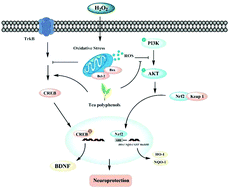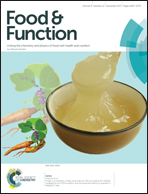Neuroprotective action of tea polyphenols on oxidative stress-induced apoptosis through the activation of the TrkB/CREB/BDNF pathway and Keap1/Nrf2 signaling pathway in SH-SY5Y cells and mice brain†
Abstract
Many studies have shown that oxidative stress is a major cause of cellular injuries in a variety of human diseases including cognitive impairment. Tea polyphenols (TPs), natural plant flavonoids found in tea plant leaves, possess the bioactivity to affect the pathogenesis of several chronic diseases via antioxidant associated mechanisms. However, the possible antioxidant and neuroprotective properties of TPs in the brain of mice housed in constant darkness and in H2O2-stimulated SH-SY5Y cells are yet to be elucidated. In this study, pretreatment with TPs markedly attenuated H2O2-elicited cell viability loss and mitochondrial dysfunction, suppressed the induced apoptosis and reduced the elevated levels of intracellular ROS and H2O2. Additionally, TPs modulate the nuclear translocation of Nrf2 and the TrkB/CREB/BDNF signaling pathway by provoking the PI3K/AKT pathway and thus, they transcriptionally regulate the downstream expression of antioxidant enzymes including HO-1, NQO-1, and BDNF in SH-SY5Y cells. Furthermore, an in vivo study revealed that housing mice in constant darkness, simulating shift work disruption in humans, notably affects the AKT/CREB/BDNF signal pathway and the nuclear translocation of Nrf2 and its downstream phase II detoxification enzymes in brain tissue. Remarkably, TP supplementation through drinking water eliminated these changes. These results suggest that TPs possess protective effects against oxidative stress-triggered cognitive impairment, which might be a potential nutritional preventive strategy for neurodegenerative diseases implicated with oxidative stress in shift workers.



 Please wait while we load your content...
Please wait while we load your content...